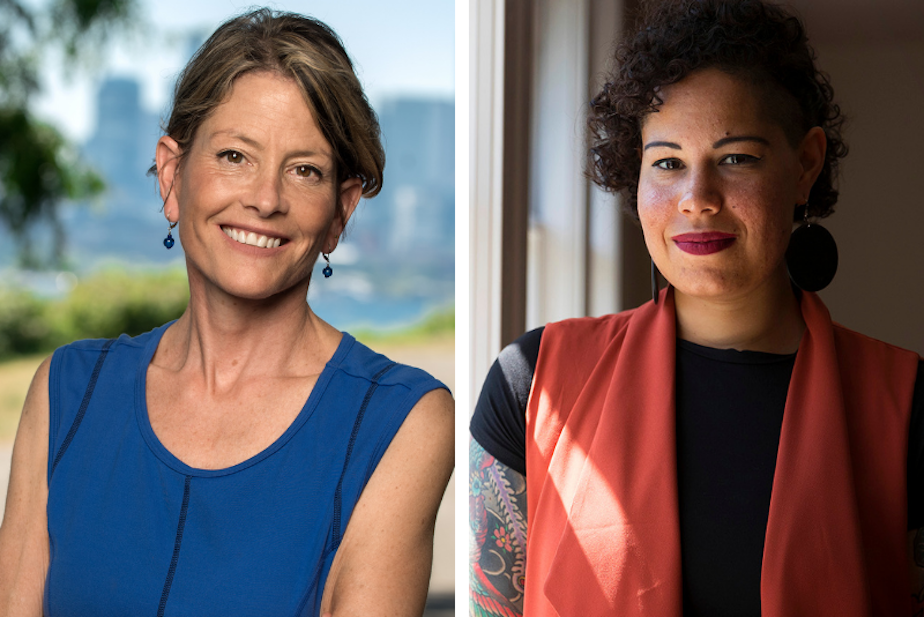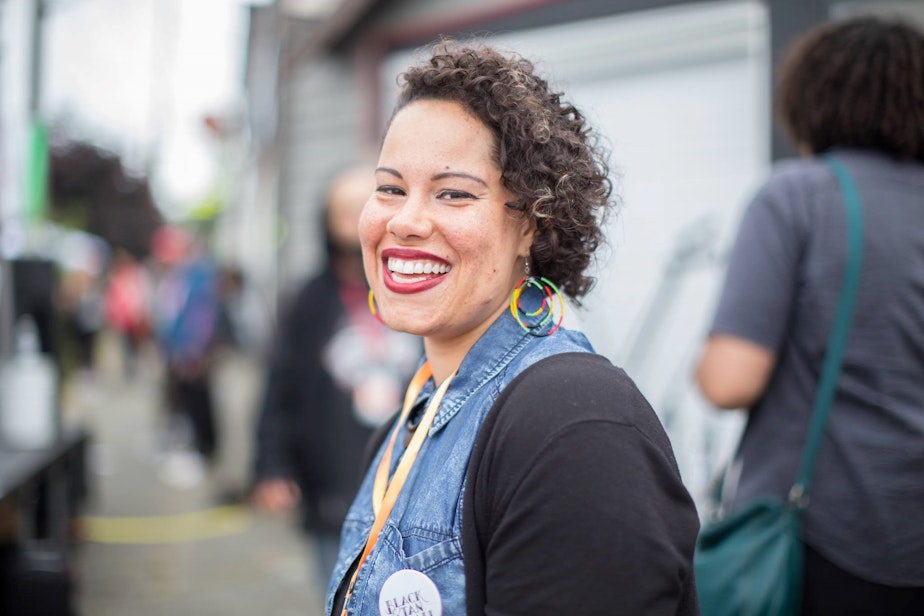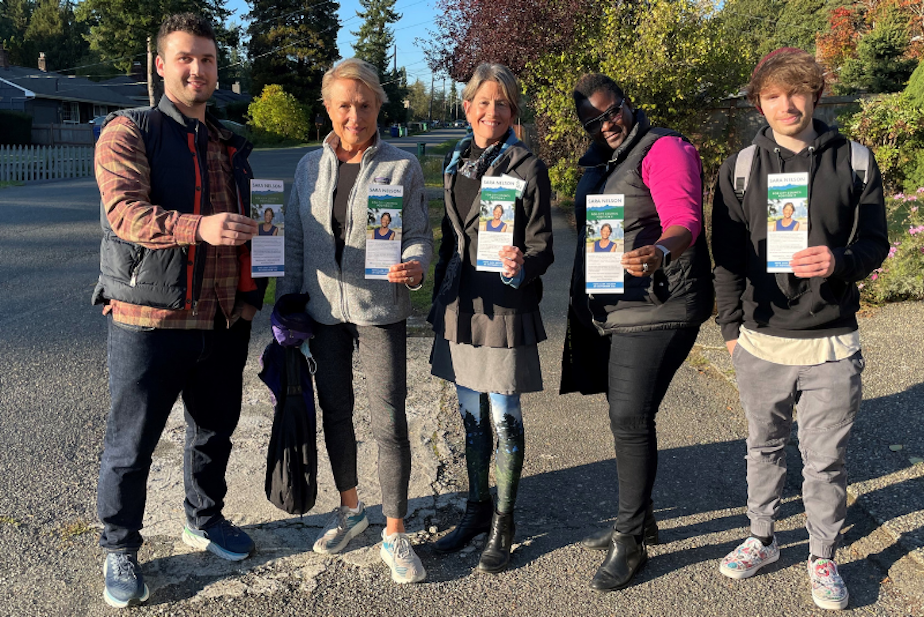Sara Nelson and Nikkita Oliver miles apart in race for Seattle City Council

If you had to explain the differences between the candidates for Seattle City Council Position 9 in two sentences, you could start with the ideological abyss that separates Nikkita Oliver and Sara Nelson.
Nikkita Oliver is an educator, attorney, and activist who wants deep systemic change to move the city further to the left. Sara Nelson is a small business owner who thinks the current City Council is already too far left and needs to move closer to the center.
Policing
Nikkita Oliver is a police abolitionist and criminal justice reformer. They ran for mayor in 2017, and also became active in the 2020 protests against police violence, citing leaders from Martin Luther King Jr. to the Black Panthers to embrace the full range of protest tactics.
Oliver and other activists called for a 50% cut to the Seattle Police Department's budget and demanded new spending elsewhere, “to invest in Black and brown communities, and to build up public health and public safety infrastructure that is community based,” Oliver said.
That included the call to make more investments in "housing, childcare and support systems for youth," which is included in Oliver's platform.
Oliver also said sending armed police is not the best approach in certain emergencies.
Sponsored
“The National Institute for Justice, which focuses on issues of mass incarceration and policing, after looking through three years of SPD 911 data, identified that 80% of calls are not connected to a criminal law violation, and 49% of calls could have had alternative non-sworn officer response,” Oliver said.
In general, Oliver said they want to address the root causes of crime, and to find alternatives to incarceration, rather than see more of the current approach that they believe still leads to too many arrests and prosecutions.

For her part, Sara Nelson, who co-owns Fremont Brewing and who used to advise former City Council Member Richard Conlin, believes the city has already swung too far left on policing. She is critical of the City Council's move to cut the police budget by roughly 20% in 2020, and she's also concerned about the number of SPD officers that have left the department in the last year and a half.
Sponsored
“I have a long list of ideas for how we should reform and improve policing, but you don't do that by cutting the budget, especially without a plan for how you're going to keep people safe,” Nelson said.
Nelson said response times for police are at an all-time high.
“People are concerned that when they call 911, nobody will come,” Nelson said.
When it comes to police funding, Nelson said she would restore what is needed to make sure there are enough cops to do the job.

Homelessness
Homelessness is a top issue for voters this year, and it’s also a top issue for the candidates. They both talk about the need to partner effectively with the King County Regional Homelessness Authority, which will take the lead in a regional approach to homelessness starting in 2022.
But beyond that, the two candidates’ understanding of homelessness and what to do about it travel in nearly opposite directions.
Nikkita Oliver is against all sweeps of homeless encampments in public spaces.
“Sweeping people further destabilizes them. And instead of further destabilizing folks for whom we don't have an option that meets their needs, we need to do everything we can to create more stability through radical accessibility,” they said.
Sponsored
By "radical accessibility," Oliver means the city should create a fund within the parks department to help homeless people who live in parks with mobile health clinics, hygiene stations and other services.
Oliver also believes Seattle and the county need to be spending more money to address homelessness.
“If we were spending enough, we would have already eliminated the crisis,” they said.
For housing, that spending needs to move to around $400 million per year in Seattle or around $1 billion per year at the King County level every year for the next 10 years, Oliver said.
“Having more public housing, more social housing, is just an essential part of building a city that actually views housing as a human right,” they said.
Oliver also believes one of the underlying reasons for the growing homelessness problem is capitalist speculation on housing. To address it, Oliver is advocating that the government buy up a large stock of housing that can't be bought and sold for a profit. Oliver calls this "de-commodifying” the housing market.
Sponsored
While critics might call some of her ideas radical or extreme, Oliver said, that language misses the point.
“Dr. Angela Davis uses the word radical to mean to get to the root, and if I am radical about anything, it is wanting to get to the root causes so we stop the crisis we're facing from ever happening again,” they said.
In contrast, Sara Nelson believes the current City Council is doing a terrible job addressing homelessness by spending money with no clear plan or results to show for it.
“Let’s get a plan first, let's show how we'll spend the money and if there's a deficit, then let's talk,” she said.
Nelson said Seattle should look to other places that have had more success with clear plans to address chronic homeless, for example.
Nelson also believes there's too much of a focus on housing itself, which leads city leaders to neglect related issues like mental illness and substance abuse. She said she would vote to dedicate more funding to address both.
On tent encampments, Nelson sees the current approach to as more inhumane than tolerant, especially for people with drug and alcohol problems, which she partly understands from personal experience.
“As somebody in recovery, I know being around your drug of choice is not helpful, so I believe that we're making homelessness worse by not addressing encampments,” Nelson said.
Unlike Oliver, Nelson supports removing tent encampments from parks and other public spaces.
Funding and Endorsements
According to the Seattle Ethics and Elections Commission, Oliver's financial contributors are most likely to work for the state of Washington, Amazon / Whole Foods, Microsoft and Google, or be currently unemployed.
Nelson has received most of her direct campaign funding from employees of the state of Washington and employees of companies including Amazon, Vulcan, and Microsoft, as well as from people who are currently unemployed.
In terms of endorsements, most organized labor groups such as the MLK Labor Council are backing Oliver, while most business organizations such as the Downtown Seattle Association support Nelson. As for newspaper endorsements, the two heavy hitters are on opposite sides as usual, with The Stranger supporting Oliver, and The Seattle Times backing Nelson.




